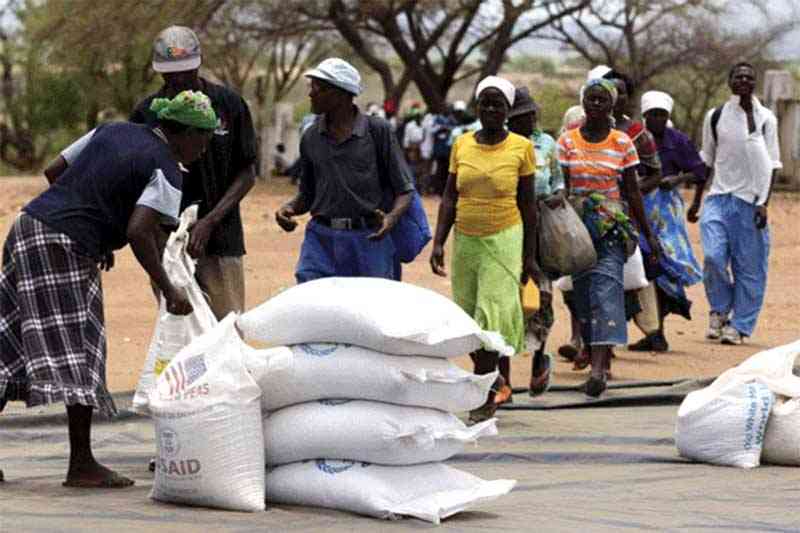
DAYS into 2024, indications are that it will be a tough year for millions of the country’s rural folk as the latest Zimbabwe Vulnerability Assessment Committee (ZimVAC) Rural Livelihoods Assessment report projects that more than 2,7 million people in the countryside are starring at hunger.
“During the peak hunger period (January to March 2024), 26% of the rural population is projected to be food insecure. This translates to 2 715 717 people. At least 100 482 metric tonnes of cereal will be required to feed the food insecure population during the peak hunger period,” the report said.
This is despite repeated government assurances that nobody would starve and the country had adequate food stocks to fend off famine.
Late last year the World Food Programme HungerMap LIVE remote monitoring platform showed a deteriorating food security situation in the country and estimated the number of people facing insufficient food consumption at five million during the first week of last month, which was an increase from the 4,1 million during the first week of September 2023.
A typical lean season is characterised by communities’ heightened incapacity to access sufficient food. The lean season occurs in the middle of the rain season when harvests from the previous year have been exhausted and prices of food are at their highest.
Zimbabweans, in general, have had a tough time feeding themselves over the years due to the southern African nation’s unrelenting economic downturn and a changing climate, with increases of basic commodities prices worsening their plight.
The United States Agency for International Development late last year said: “The depreciation of the ZWL (Zimbabwe dollar) is limiting household purchasing power … Relatedly, prices of wheat flour, maize meal, sugar and rice are over 400 to nearly 545% higher than last year (2022) in ZWL, with bread and vegetable oil prices increasing by around 240 to 300% in ZWL compared to prices last year.”
In April last year the country’s Zimbabwe National Statistics Agency also reported 11% and 11,6% increases in the food poverty and total consumption poverty datum lines, respectively, compared to March of the same year, highlighting the country’s ever deteriorating food situation.
- DPC pays out $139 million
- Zimdollar shortage hits market
- Nedbank Zim profit surges
- Editor's Memo : Clean up procurement corruption
Keep Reading
National Consumer Rights Association coordinator and human rights advocate Effie Ncube said the ZimVAC report exposes people’s worst fears.
“There is going to be massive food and water insecurity which will lead to severe and acute malnutrition and thousands of livestock dying. What is now needed is for the government to ensure an adequate budget for vulnerable people. This means budgeting for both the people and livestock,” Ncube said.
“Equally important, food distribution should be completely divorced from partisan politics which has become a culture and norm. Every person should have access to food regardless of the political party they support.”
Development practitioner and Speaker of Nkayi Community parliament Nhlanhla Moses Ncube said it is very concerning that such a huge number of people will be food insecure.
He said the number is conservative and the stifling of non-governmental organisations’ activities will come into the spotlight.
“I would advise the citizens to try the best they can to stock food and help those who cannot, including child-headed families. On the part of the government, an enabling environment should be created in which independent organisations are allowed to assist. We have always relied on them. Government should desist from engaging in what one would term food propaganda and do the right thing as soon as possible,” Ncube said.
Ncube said the projected food situation will have a devastating effect, especially on marginalised communities in Matabeleland.
“Child malnutrition will worsen. It will exacerbate poverty levels as more attention and resources will be channelled to sourcing food than economic advancement. Some children are also likely to drop out from school due to failure to pay school fees. The picture is very gloomy, to say the least,” Ncube said.
Esigodini-based farmer who is also Kirton Farmers Association chairperson Moksesti Basuthu said food insecurity is the reality on the ground.
“Significant crops have failed already and livestock are not necessarily in the best of conditions. Veld is fair, but too early to comment given that it's early January. In addition the rampant mine/farm disputes with lots of agricultural land being under gold panning … many farmers who depend on rivers for dry season irrigation cannot anymore due to intense siltation caused by panning upstream,” Basuthu said.
“Direct barter trade of livestock for grains will be to the disadvantage of livestock farmers, given high grain prices which will likely increase while livestock body conditions drop and thus, market value will be depreciating. In addition the introduction of Zimra tax on livestock enterprises when the major factors affecting livestock farming as a sector have largely remained unaddressed is adding to the problem.”
Matabeleland North Rural Community Empowerment Trust coordinator Vumani Ndlovu said the majority of people have already started experiencing drought because of the poor harvest in the last agricultural season.
“Another serious drought is looming because of the erratic rains … We hope the government has already started coming up with mechanisms of dealing with this drought by ensuring that there is adequate food supplies. The government must also start engaging the international humanitarian non-governmental organisations that deal with food aid,” Ndlovu said.
Ndlovu said political manipulation also becomes rife as food aid gets politicised and distributed along political party lines or affiliations.
“A serious multi-stakeholder mechanism needs to be established in every rural district to ensure equal, fair access and distribution of food aid to citizens,” he said.











